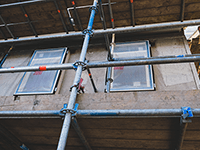
Property development can be profitable and exciting, but it often comes with large costs that can be hard to cover.
This guide will cover the basics of property development finance, including how to apply and when it might be needed. It also covers common questions about whether you need planning permission and the risks involved.
Whether you're planning a big or small project, understanding these basics will guide you through the process.
What is property development finance?
Property development finance can help you cover project costs, like buying the site and building expenses. It's a short-term solution, typically lasting up to 36 months.
Usually, the loan is repaid in full at the end of the term, unlike the monthly payments seen with mortgages. This means you will need to have a clear exit strategy or plan for repaying the loan, such as selling the house or refinancing.
While this can be a good funding option, the interest rates are usually higher than long-term solutions. So, you should consider this before applying.
When might finance be needed for a development project?
Development finance may be needed when you would find it hard to cover the project costs yourself. It can be crucial if you're undertaking projects like building or converting properties and don’t have the funding to start or complete them.
It can be suitable for both first-time and experienced developers and can support a wide range of project types.
How do property developers raise finance?
Property developers may fund their projects using a mix of different methods. This may include their savings, property development loans from lenders, or money from family members, friends, business partners, or others with an interest in the project.
The funding needed depends on the project's size. Smaller projects typically need less funding due to fewer materials and lower costs. On the other hand, larger ground-up developments may need more expertise and resources, causing costs to rise. These factors may also affect the funding methods used.
Are there many property development finance lenders?
This is a niche area of lending and it is more complex to navigate. Due to this, there are typically fewer lenders in this space compared to more traditional options like mortgages.
However, there are plenty of development finance lenders available who can help with supporting various property projects and needs.
Can I get property development finance?
You may qualify for this option, but eligibility varies between lenders. So, it depends on the specifics of your application and the lender's criteria.
Before approving your loan, lenders will want to understand your exit strategy. Without a clear plan for repaying the loan, you will struggle to get accepted. The lender needs to be certain you can repay it, otherwise, they will be hesitant to lend to you.
Additionally, factors like your credit history and the gross development value of the project may also impact your success.
What does gross development value mean?
Gross development value is the estimated value of a project once all the work is completed. It is a key metric that lenders carefully consider when deciding whether to approve your loan and how much to offer you.
It shows the possible revenue you will earn from selling or renting it out once the project is completed. Therefore, it's good to familiarise yourself with this metric and watch it closely as the project moves forward.
How long does a property development finance application take?
The timeline for each application varies due to different information requirements and parties involved in the process. It is a complex area, which needs different types of documentation including planning permissions, cost breakdowns, and other project-relevant details.
Additionally, a valuation will be required and your exit strategy needs to be clearly understood. If you are proactive and provide all the documentation and information to the lender quickly, the process can be faster.
What are the risks of property development?
While starting a project can have its benefits, it's important to be aware of certain risks.
The property market, like any market, can change. For example, material costs can rise, which can affect your expected profits. Increased prices overall may also reduce buyer interest, making it harder to sell the property once it's done. Therefore, it's good to watch the market closely, stay informed about new trends, and have a backup plan ready.
Also, unforeseen problems such as material shortages or weather delays can occur during the project, causing costs to rise and impacting your profits. Planning ahead can help reduce these risks, but some factors may still be beyond your control.
Finally, there could be quality issues if the professionals you hired didn't meet your standards. Fixing these problems may need extra materials or resources, leading to higher costs. Regular meetings and site visits can help you closely monitor progress to prevent or catch problems early on.
There are various other risks to consider, but these are some of the main ones you should watch out for and have backup plans ready for if they occur.
Should I have a contingency plan ready?
Yes, it's crucial to have a backup plan or budget in place for unexpected costs that may arise. Construction projects can be unpredictable, with changing costs, delays, or unforeseen issues that may need extra funds.
It's important to plan for these and make sure you have a clear idea of how you will manage them effectively.
How do I apply for property development finance?
Start by contacting a lender or broker to show your interest. Once you've made your enquiry, they will guide you through the process and help with your application.
To find the best provider, research your options carefully. Make sure you review customer feedback and check the costs involved with each provider.
Frequently asked questions
Can I get property development finance without having planning permission?
It depends on the lender. Some may proceed without planning permission, while others may need it before approving your loan. So, it varies based on the lender's requirements.
What might I need to provide to the lender?
When applying for property development financing, you'll need to provide certain information to proceed with your application. This may include:
- Purchase price of the land or property
- Estimated building costs
- Projected gross development value
- Detailed cost breakdown
- A clear timeline for the project
- Planning permission details
- Information on your exit strategy
- Details of your contingency plans
Extra details might be needed, but the lender or broker will discuss these with you.
What type of projects can you use this finance for?
This flexible funding option can be used for various property types and projects, including residential, commercial, and mixed-use properties. It is suitable for a wide range of scales, from ground-up developments to smaller property projects.
Summary
In summary, property development finance can be essential for funding different projects like building or converting houses. Therefore, this guide has aimed to cover key aspects like what it is, how to apply, and managing risks. By understanding these basics and staying aware of market changes, you can make an informed decision.
Any property used as security, which may include your home, may be repossessed if you do not keep up repayments on your mortgage.




